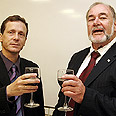Livni: Security fence route negotiable
(VIDEO) Foreign minister says during World Economic Forum panel in Sharm al-Sheikh that ‘security fence advances two-state solution; when talks are held on the matter Israel will not be opposed to moving or replacing it.’ Abbas: Israel must abandon unilateralism policy
VIDEO - Foreign Minister Tzipi Livni said Sunday that the route of the West Bank security fence is negotiable and may be altered.
Video: Reuters
Addressing a panel also made up of Palestinian Authority Chairman Mahmoud Abbas, chief Palestinian negotiator Saeb Erekat and Egyptian Foreign Minister Ahmed Aboul Gheit, Livni said the security fence advances the two-state solution, adding that in future talks between the sides on the matter “Israel will not be opposed to negotiating on the fence or even moving or replacing it.”
During the panel, which was held in the framework of the World Economic Forum in Sharm al-Sheikh, the foreign minister said unilateralism is not a part of the Israeli government’s official policy but rather a way to end the stalemate hindering the two-state option.
Livni also said the slogan “there is no Palestinian partner” is not an excuse, adding that a future partner must have the will to advance the process and the ability to implement the agreements signed by both sides.”
Abbas, for his part, reiterated his stance that the Palestinian government must meet the three demands it was presented with: Acknowledgement of past agreements with Israel, denouncing violence and respecting the Arab peace initiative.
The PA chairman said he still believes the Hamas-led government should be given a chance, adding that dialogue between the various Palestinian factions is expected to commence in the coming days in a bid to formulate a clear and official stance.
'Iran trying to take control over Arab world'
Abbas called on the Israeli government to ‘abandon its policy of unilateralism’ and return to the negotiations table. Any agreement with Israel will be held to a national referendum, he said.
“Unilateralism will not bring security to either nation,” Abbas said. “It will bring an end to the two-state solution and result in an increase in violence.”
Vice Premier Shimon Peres, who participated in another panel, was confronted by Palestinian youngsters who complained of Israel’s policy toward the PA.
“It is the Israeli policy that brought about the full withdrawal from Gaza,” Peres told the youngsters.
He also warned that Iran is trying to take control over the Arab world, and said that the Arab world must unite against this threat.
In a discussion on the situation of the Palestinian economy Peres suggested to set up more free-trade zones in the region and draft agreements on economic cooperation.
Israeli Tourism Minister Isaac Herzog and his Jordanian and Egyptian counterparts agreed on preparing a plan to market tourist packages to the Middle East.
During the forum, which was also attended by Finance Minister Abraham Hirchson, it was also agreed that joint Israel-Jordan-Egypt task forces will be set up to promote tourism to the region.
Hirchson and Conference of Presidents Head Malcolm Hoenlein agreed that representatives of the Jewish organization will also take part in developing a plan to prepare tourist packages to Israel and Egypt for North American residents.
The Egyptian tourism minister asked that Israel lower its travel warning on Sinai.
Attila Somfalvi contributed to the report
















